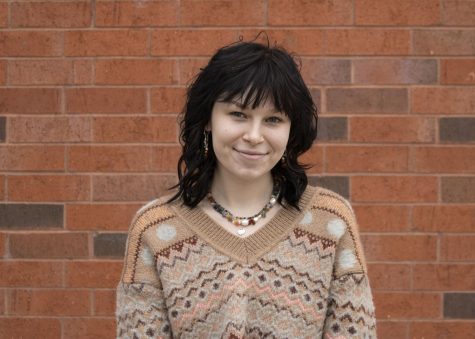UWEC undergraduate and graduate students to do research with healthcare professionals
Partnership creates Blugold Biomedical Innovator program gives student research opportunities
Photo by UW-Eau Claire
Blugold Biomedical Innovator Program
Editor’s note: Aeda Estelle uses she/they pronouns, but just they/them pronouns will be used for clarification purposes.
This academic school year, 10 students from the Blugold Biomedical Innovator Program were chosen to be Innovator Scholars.
The program is competitive, with an average of 200 applications received annually.
Lydia Staebell, an innovative scholar, said, “as an undergrad, this is a really great hands-on experience to have very early in my career. I am learning from those in the field how labs and research are done.”
The chosen students gain real-life experience by being “embedded in research and innovation,” according to UW-Eau Claire.
2022-2023 scholars include Emily Baldwin, Easton Blissenbach, Tatiana Bobrowicz, Catalina Decker, Sophie Gardiner, Emma Jiter, Sara Multhauf, Lydia Staebell, Samuel Stumo and Aeda Zank.
Eligibility for Innovative scholars includes maintaining a 3.5 GPA, taking 30 credit hours per academic year and remaining dedicated to health care or biomedical fields, according to UW-Eau Claire.
“This opportunity has contributed to my personal growth as well as given me a boost for Graduate school and my future career,” Zank said.
They said this has pushed their boundaries and their understanding of the politics involved in science. The program gave them a clearer idea of what it takes to make a good innovator.
By being selected, the scholars work alongside Mayo Clinic Health System professionals and receive a $32,000 scholarship, guaranteed research, special event invites and one-on-one mentoring.
“The research I am doing right now can have a tangible impact on many patients,” Staebell said.
The current research projects available to the innovators are:
- Prenatal stress and neurodevelopment in autism
- Neurobiology of alcohol effects in the aged population
- An educational intervention to reduce postoperative opioid use
- Developing medical models through 3D printing
- Materials characterization of injectable foam
- Surface-enhanced raman spectroscopy of human saliva as a non-invasive tool for cancer diagnostics
- Mapping and quantifying tissue fibrosis
- Using machine learning to identify relationships between complex diseases
- Using artificial intelligence to diagnose diseases
- Mayo Clinic Family Medicine resident wellness study
- Genetic variants and disease
Mayo Clinic and UW-Eau Claire arranged a new collaborative research agreement that extends the research for 10 more years, according to UW-Eau Claire.
Sara Carstens, operations manager of clinical research and innovation for Mayo Clinic Health System in Northwest Wisconsin, said even if students aren’t a part of this program there are always other opportunities past what they’re getting in your curriculum.
“If you are interested in healthcare and science, we can find ways to get everyone involved, not just the innovators. Ask advisors and professors to connect with Mayo Clinic to gain experience and collaborate,” Carstens said.
She said programs like this give students real-life experiences that are unique and deepen their understanding.
Contact Admissions by email at admissions@uwec.edu or by phone at 715-836-5415.
Maxwell can be reached at maxwelbk4749@uwec.edu.

Bridget Maxwell is a fourth-year journalism and political science student, and this is her third semester on The Spectator staff. When she isn't writing for The Spectator, she is with friends sitting on the couch binging "Dance Mom's" or "It's Always Sunny in Philadelphia."

